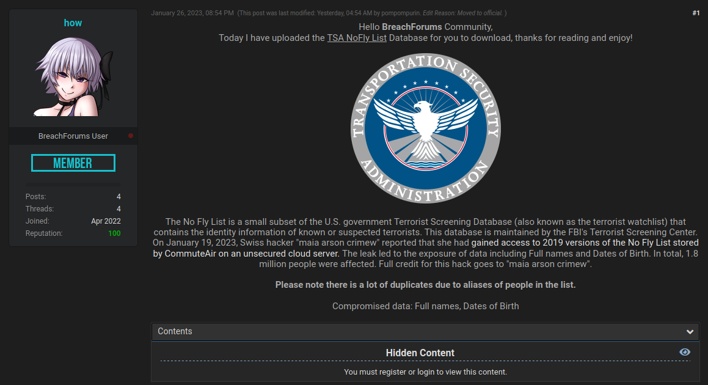Hacking Forum Exposes Entire US No Fly List Of Over 1.5M Names As TSA Investigates
Crimew originally came into possession of this list when browsing the Jenkins servers on ZoomEye, which, similar to Shodan, lets users search for servers connected to the internet. The hacker happened to come across a Jenkins server operated by the airline CommuteAir. After digging through this server for a time, crimew discovered credentials for the company’s Amazon Web Services (AWS) infrastructure. The hacker then used the credentials to connect to this infrastructure, which crimew found to contain a 2019 copy of the No Fly List, as well as a “selectee” list. This second list likely names all those who are subject to Secondary Security Screening Selection (SSSS).
In a blog post published by crimew, the hacker acknowledges that these lists are sensitive in nature before stating, “[I] believe it is in the public interest for this list to be made available to journalists and human rights organizations.” Crimew accordingly made the lists available for access upon request, requiring that applicants be journalists, researchers, or other parties with legitimate interest. The service hosting the lists, Distributed Denial of Secrets, further states that requests will probably be rejected if interested individuals don’t provide sufficient information to verify their identities and if said individuals are “hacktivist[s] that want to exploit the data” or “researcher[s] without a clear journalist or academic project.”
Meanwhile, both CommuteAir and the Transportation Security Administration (TSA) are investigating crimew’s unauthorized access to the airline’s AWS infrastructure. A TSA spokesperson made the following statement to BleepingComputer: “On January 27, TSA issued a security directive to airports and air carriers. The security directive reinforces existing requirements on handling sensitive security information and personally identifiable information. We will continue to work with partners to ensure that they implement security requirements to safeguard systems and networks from cyberattacks.”
A CommuteAir spokesperson also made a statement to BleepingComputer: “CommuteAir was notified by a member of the security research community who identified a misconfigured development server. The researcher accessed files uploaded to the server in July 2022 that included outdated 2019 versions of the federal no-fly and selectee lists that contained certain individuals' names and dates of birth. The lists were used for testing our software-based compliance process for implementing federally-mandated security requirements. Additionally, through the server, the researcher accessed a database containing personal identifiable information of CommuteAir employees. CommuteAir immediately took the affected server offline and started an investigation to determine the extent of data access. To date, our investigation indicates that no customer data was exposed. CommuteAir has reported the data exposure to the Cybersecurity and Infrastructure Security Agency, and also notified its employees.”


